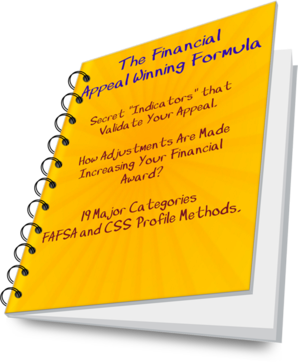“Understanding the Logic Behind the Decision”
- 19 “Special Circumstance” Categories with “indicators” the Financial Aid Office would prefer you did not know!
- Learn how certain adjustments to income and/or assets are made which will help you be more successful with your financial aid appeal.
- Specific examples of appropriate documentation that goes with your letter.
- Guidelines that increase your chances for success.
- FAFSA and CSS PROFILE formulas differ in many areas, we break those down for you.

Jim Kuhner, Author
Section 1- Introduction
Professional Judgment
Special Circumstances
Section 2 – Appeal Categories
These categories are broad subject areas whereby there can be many reasons inside of the category that might qualify.
- Typical Methodology Approach (Federal – FAFSA and Institutional – CSS Profile)
- Special Circumstance “Indicators or Triggers”
- Possible Modification Upon Appeal (Federal and Institutional explaining differences)
- The burdent of Proof Document your appeal (very important)
[Sample] Category # 5 – One-Time Taxable Income 7 Valid Examples
Typical Methodology Approach
- FM uses income reported in base year that includes one-time taxable income included in the adjusted gross income (“AGI”) in computing the expected family contribution (“EFC”).
- IM uses the same standard treatment.
Special Circumstance Indicators
- One-time income events are not representative of a family’s annual income from year to year. Here are some examples where your appeal can warrant an adjustment by the Financial Aid Office.
- Bonus income not expected in the future
- Capital Gains, Gambling, or Prize earnings like lottery
- Insurance settlements
- Employer reimbursement for moving expenses
- Early distribution of retirement plan or IRA to income
- Conversion of traditional IRA to Roth IRA
- Termination of employment resulting in vacation/sick day pay out.
Possible FM Modifications upon Appeal
- You can ask that the adjusted gross income (“AGI”) number be reduced by the amount of the one-time income event. When this is done even though you owe tax liability on the one-time income event the FAA may adjust income taxes paid to reflect the reduction in AGI (this conflicts with reality “actual taxes paid”). Ask to lower AGI and point out your tax liability remains the same for federal tax purposes, and indicate the amount of total tax paid. What you are saying is there should not be a reduction in the financial aid adjustment for taxes paid.
- The FAA might zero out the one-time income event and count it as an asset. Consideration should be given to any type of expense incurred that relates to the one-time income event. The expense/s should be included in the appeal letter as back-up for the zero out method treating the income as an asset.
Possible IM Modifications upon Appeal
- IM can adjust in the same manner.
“The Burden of Proof” Document Your Appeal
- Appeal letter should provide explanation of the one-time income detail in necessary detail to fully document the occurrence.
- Provide documentation from the source of the one-time income event that indeed it is a one-time event, one-time bonus from employer have the employer provide a letter indicating that the income event is not expected to be repeated.
- Documentation/receipts of expenses related to the acquisition of the one-time income event (medical expenses related to insurance reimbursement, federal expenses related to taxable life insurance proceeds).
Section 3 – Best Practices Appeal Letter Approach
The Winning Formula for Success | “Approach and Documentation”
One good idea might result in much more financial aid.
How will you know the strategy ideas you missed?



 How to
How to